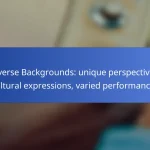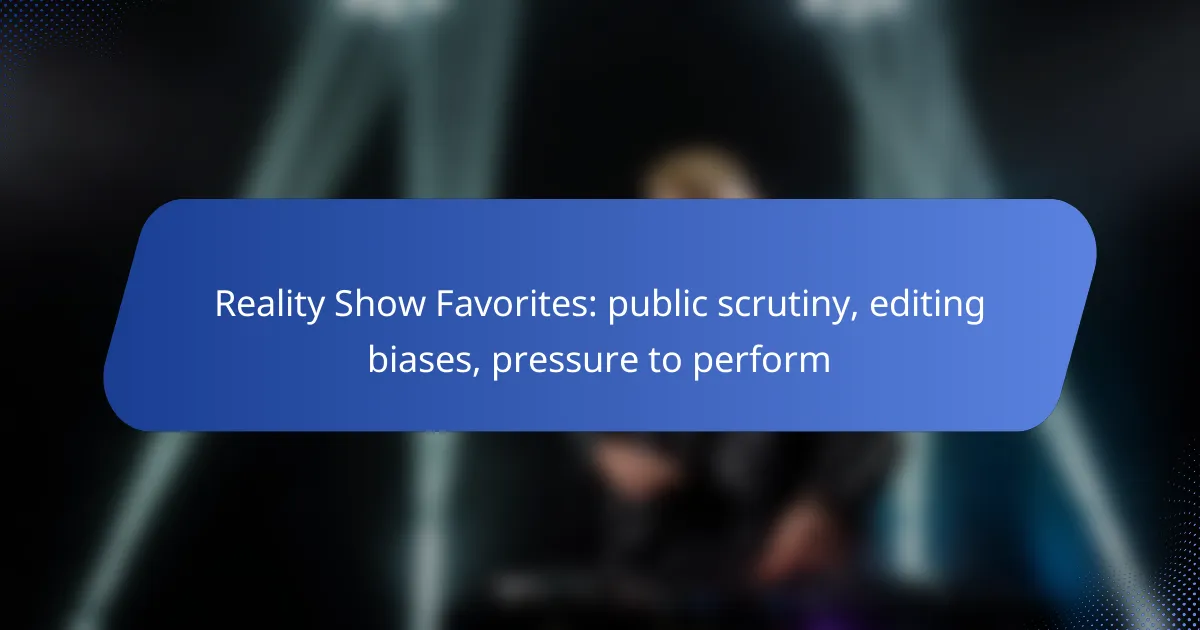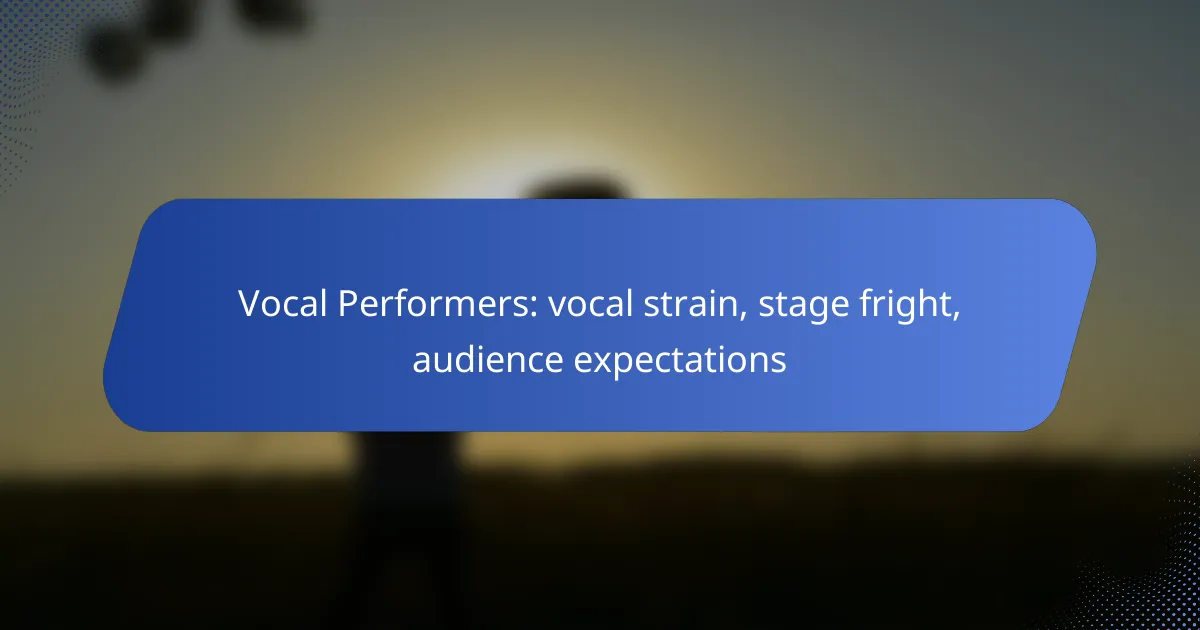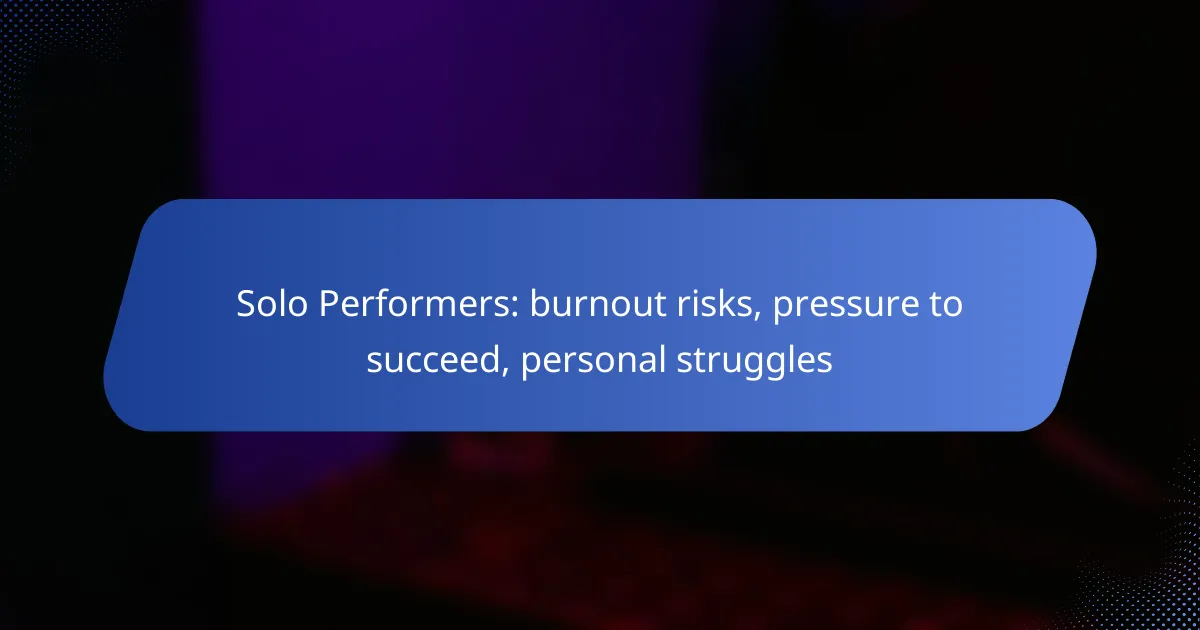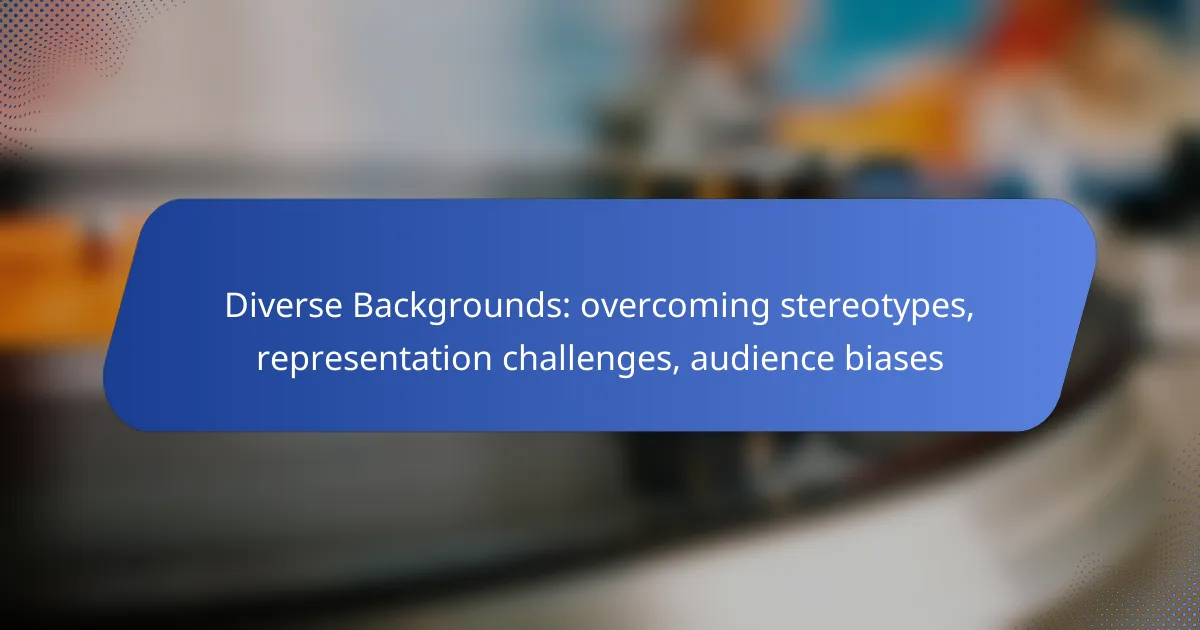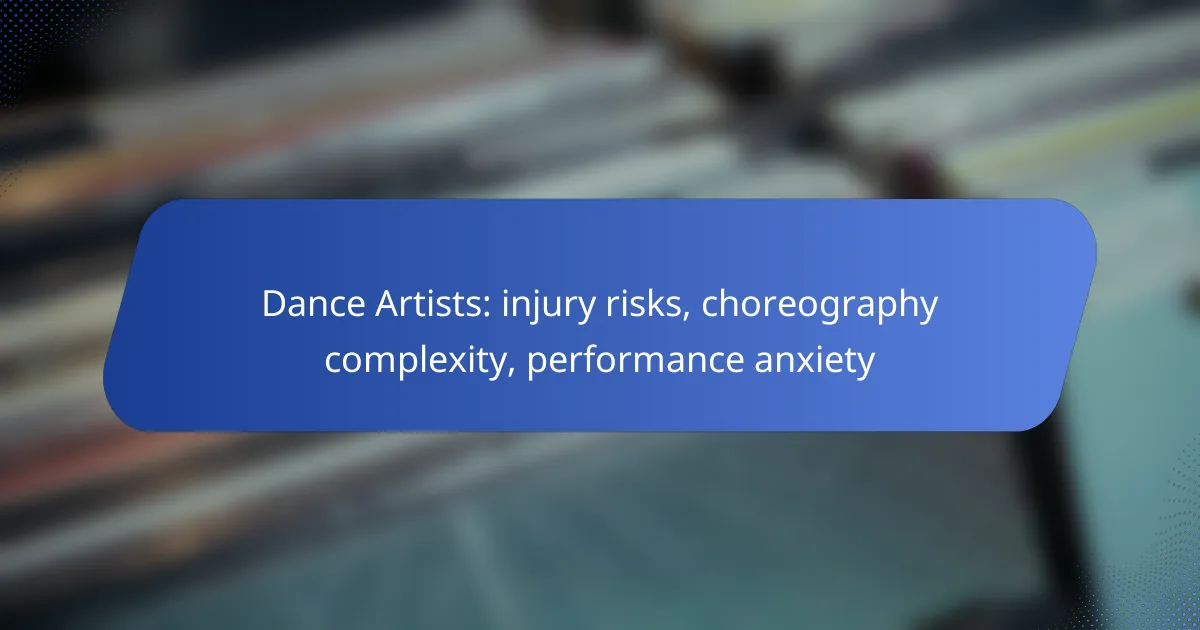Reality shows offer a unique glimpse into the lives of participants, yet they come with significant challenges, including public scrutiny and editing biases. Contestants often face intense pressure to perform, which can lead to mental health struggles and affect their relationships. The portrayal of events can be heavily influenced by editing, shaping audience perceptions and narratives that may not reflect reality. As participants navigate their public and private personas, the impact of these factors can be profound and far-reaching.
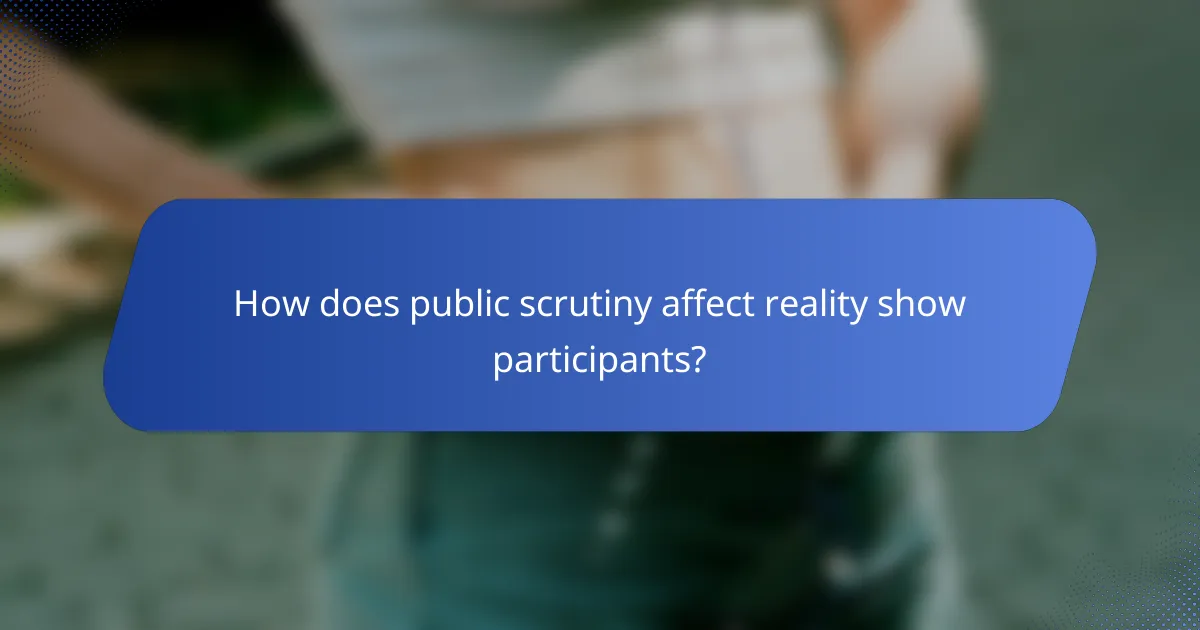
How does public scrutiny affect reality show participants?
Public scrutiny significantly impacts reality show participants by subjecting them to intense examination from viewers and media. This pressure can lead to various mental health challenges and strain personal relationships, as contestants navigate their public personas versus their private lives.
Increased mental health challenges
The constant visibility and judgment from audiences can lead to heightened anxiety, depression, and stress among reality show participants. Many face overwhelming feelings of inadequacy or fear of failure, which can be exacerbated by editing that portrays them unfavorably.
Participants often report feeling isolated, as their experiences may not be understood by friends or family who haven’t experienced similar scrutiny. Seeking professional help or support groups can be beneficial for managing these mental health challenges.
Impact on personal relationships
Reality show participants frequently find their personal relationships tested due to public scrutiny. Friends and family may feel the pressure of being associated with a contestant, leading to tension or misunderstandings.
Moreover, romantic relationships can suffer as partners deal with jealousy or insecurity stemming from public attention. Open communication and setting boundaries can help mitigate these issues.
Public backlash and social media pressure
Social media platforms amplify public backlash, where contestants can face harsh criticism or even harassment. Negative comments can have a lasting impact on a participant’s self-esteem and mental well-being.
To cope, many participants choose to limit their social media engagement or curate their online presence carefully. Engaging with supportive communities or focusing on positive feedback can help counteract the negative effects of public scrutiny.
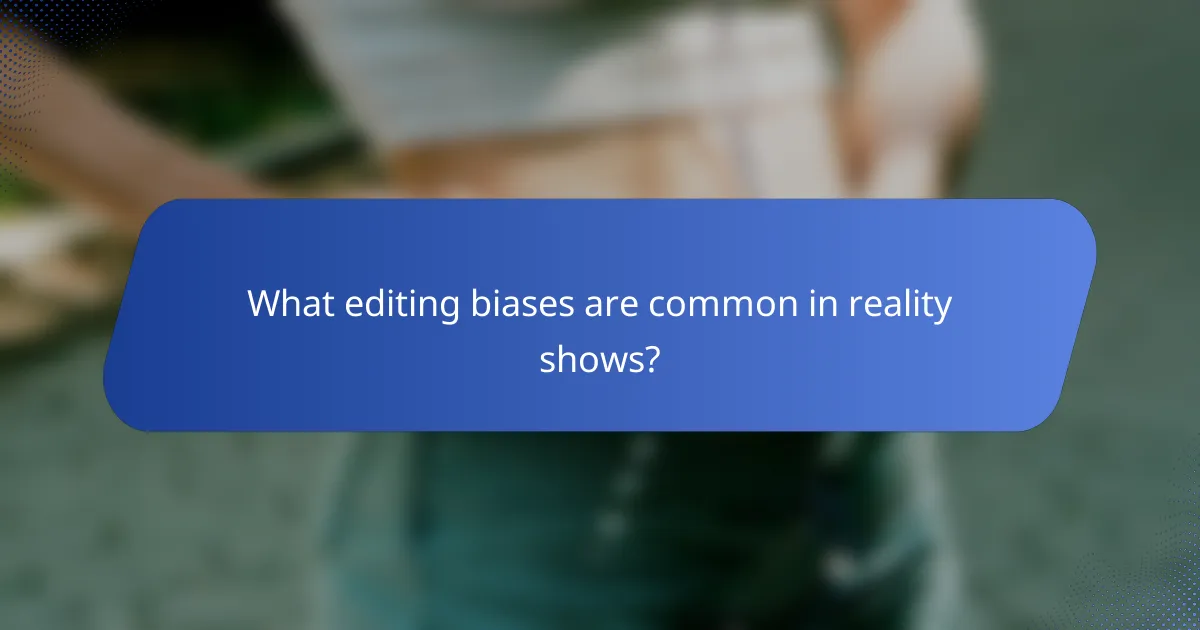
What editing biases are common in reality shows?
Editing biases in reality shows often shape how participants and events are portrayed, influencing audience perception. These biases can lead to skewed narratives that emphasize drama or conflict, impacting viewers’ understanding of the actual events.
Selective storytelling techniques
Selective storytelling techniques involve choosing specific moments to highlight while omitting others, creating a narrative that may not reflect reality. Producers often focus on the most entertaining or dramatic scenes, which can misrepresent participants’ true personalities or relationships.
For instance, a contestant might be shown in a negative light by only airing their arguments while ignoring their moments of kindness. This selective editing can lead to a skewed public perception, where viewers form opinions based on incomplete information.
Character framing and narrative manipulation
Character framing refers to the way producers present individuals in a specific light to fit a desired narrative. This manipulation can involve emphasizing certain traits or behaviors while downplaying others, effectively crafting a persona that may not be accurate.
For example, a participant may be framed as a “villain” through careful editing of their comments and actions, influencing audience reactions and potentially affecting their life outside the show. This can lead to real-world consequences, such as social media backlash or damaged reputations.
Editing to create conflict
Editing to create conflict is a common strategy used to enhance drama and viewer engagement. Producers may splice together clips from different moments to fabricate confrontations or tension between participants, even if those interactions did not occur as portrayed.
This technique can mislead audiences into believing there is more animosity or rivalry than actually exists, driving viewership through sensationalism. Viewers should be aware that what they see may be a constructed narrative rather than an accurate depiction of events.
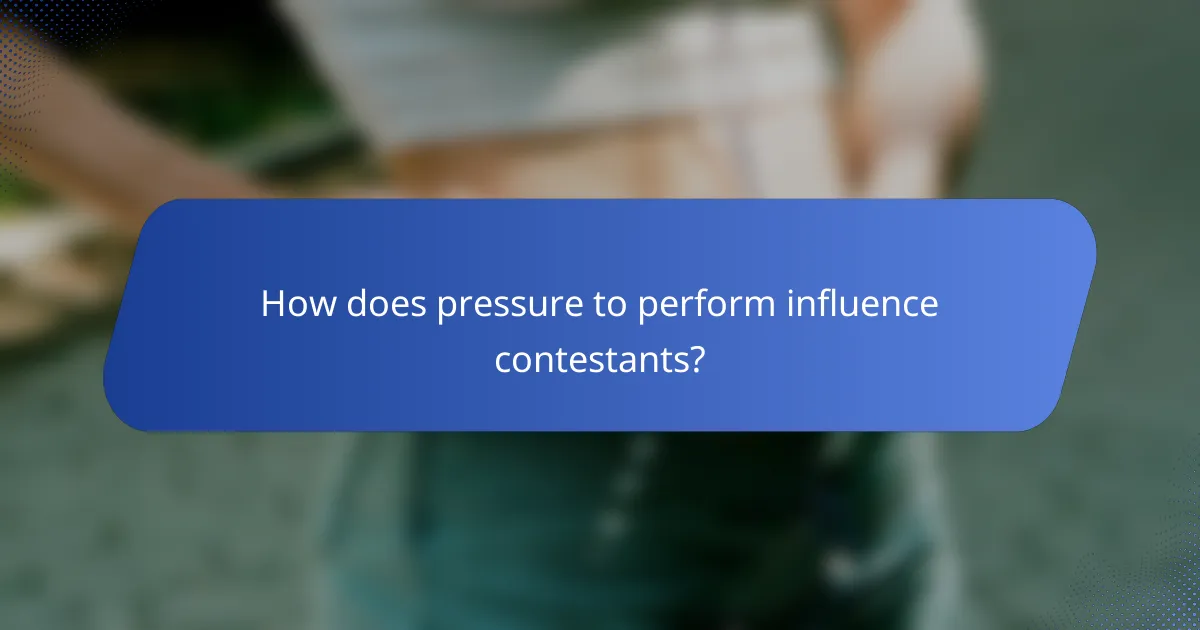
How does pressure to perform influence contestants?
Pressure to perform significantly impacts contestants in reality shows, often leading to increased stress and altered behavior. This pressure can stem from competition, public scrutiny, and the desire to maintain a favorable image, which can ultimately affect their authenticity and decision-making processes.
Heightened stress levels
Contestants frequently experience heightened stress levels due to the competitive environment and the constant evaluation by both producers and viewers. This stress can manifest in physical symptoms such as fatigue, anxiety, and irritability, which may hinder their ability to perform effectively.
Moreover, the pressure to meet expectations can lead to burnout, making it essential for contestants to develop coping strategies. Techniques such as mindfulness, regular breaks, and support from fellow contestants can help mitigate stress and improve overall performance.
Altered behavior and authenticity
The pressure to perform often results in altered behavior, as contestants may feel compelled to act in ways that align with the show’s narrative or audience expectations. This can lead to a loss of authenticity, as individuals prioritize entertainment value over genuine self-expression.
For example, a contestant might exaggerate their reactions or opinions to create drama, which can distort their true personality. Maintaining authenticity is crucial for long-term success, as viewers tend to connect more with relatable and genuine individuals.
Impact on decision-making
Pressure can significantly influence contestants’ decision-making processes, often leading to impulsive choices driven by immediate emotional responses rather than rational thought. This can result in strategic errors, such as forming alliances based on fleeting emotions rather than long-term benefits.
To counteract this, contestants should practice reflective decision-making, taking time to weigh their options and consider the potential consequences. Developing a clear strategy and sticking to it can help navigate the complexities of the competition while minimizing the impact of external pressures.
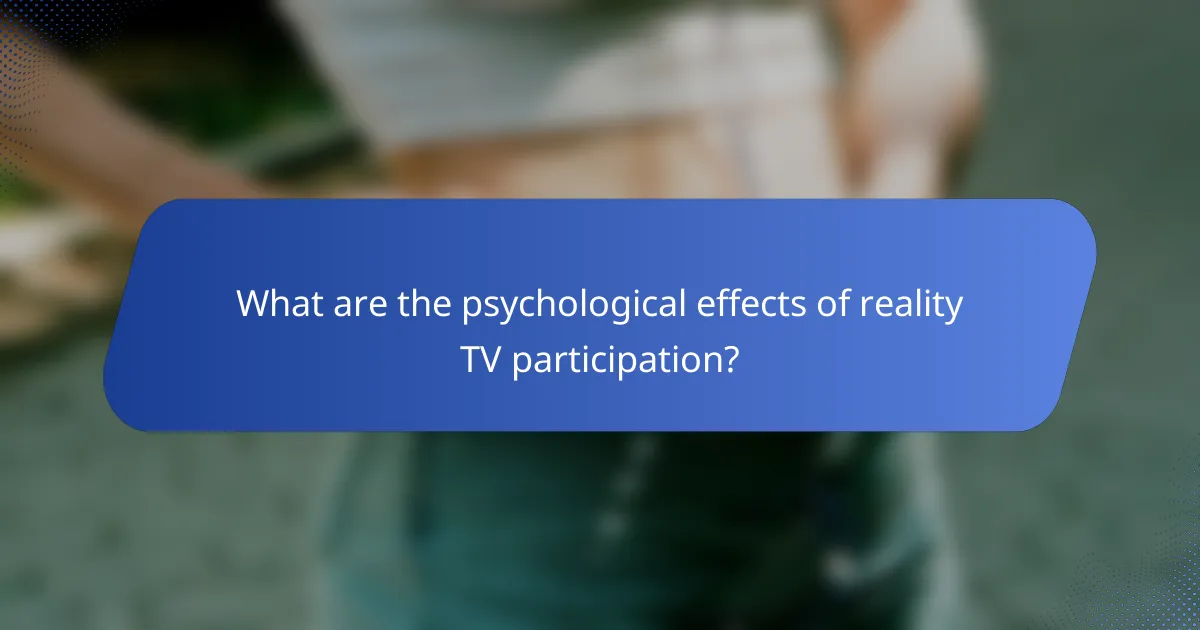
What are the psychological effects of reality TV participation?
Participating in reality TV can lead to significant psychological effects, including identity issues, increased anxiety, and challenges related to fame and privacy. These effects arise from the intense public scrutiny, editing biases, and pressure to perform that participants face throughout the experience.
Long-term identity issues
Reality TV participants often struggle with long-term identity issues as their on-screen personas can overshadow their true selves. The editing process typically emphasizes certain traits or behaviors, which may not accurately reflect the individual’s personality. This misrepresentation can lead to confusion about self-identity and how they are perceived by others.
Many former contestants report feeling trapped by the roles they played on television, leading to difficulties in personal relationships and career choices. It is crucial for participants to engage in self-reflection and seek support to navigate these identity challenges effectively.
Increased anxiety and depression
The pressure to perform and maintain a certain image can significantly increase anxiety and depression among reality TV participants. Constant public scrutiny and criticism can lead to feelings of inadequacy and self-doubt, which may persist long after the show ends. Participants often find themselves in a cycle of comparison with others, exacerbating these mental health issues.
To combat these feelings, it is essential for individuals to establish a strong support network and consider professional mental health resources. Practicing mindfulness and self-care can also help mitigate anxiety and promote emotional well-being.
Struggles with fame and privacy
Reality TV fame often comes with a loss of privacy, which can be overwhelming for participants. The sudden attention can lead to unwanted scrutiny of personal lives, making it difficult to maintain boundaries. Many individuals report feeling anxious about being constantly watched and judged, which can strain relationships and lead to isolation.
To manage these struggles, participants should set clear boundaries regarding their public and private lives. Engaging with legal professionals to understand rights related to privacy and public exposure can also be beneficial. It is important to prioritize mental health and seek help when the pressures of fame become too intense.
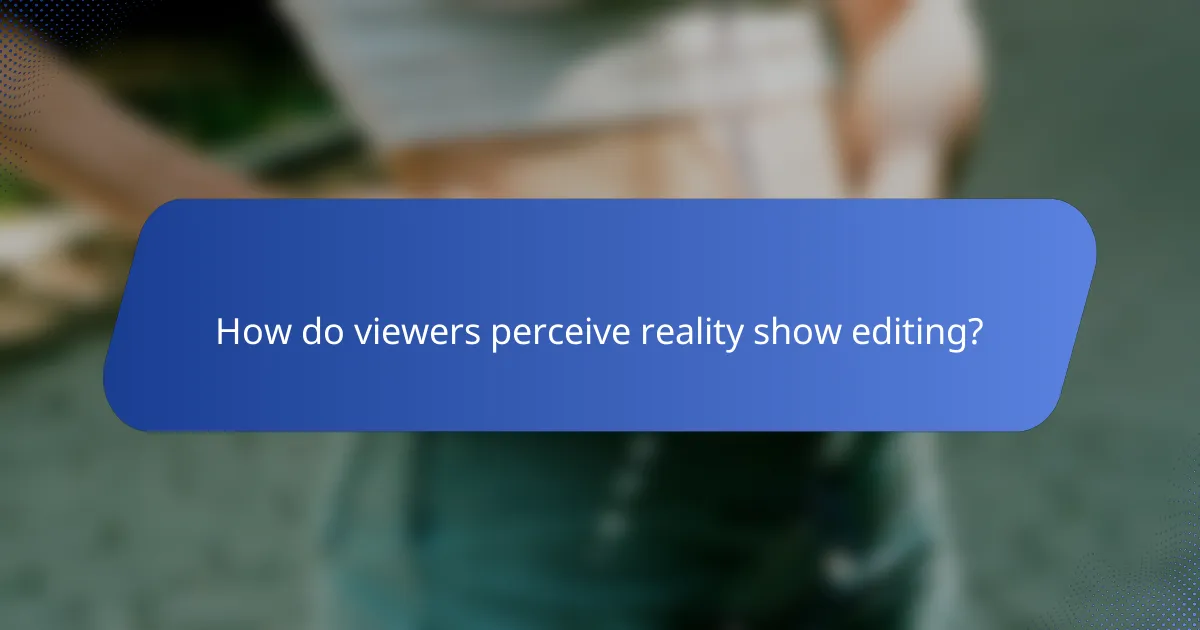
How do viewers perceive reality show editing?
Viewers often recognize that reality show editing significantly shapes their perception of events and characters. The editing process can create narratives that may not accurately reflect the actual experiences of participants, leading to a skewed understanding of reality.
Awareness of manipulation
Many viewers are increasingly aware that reality shows employ editing techniques to manipulate the storyline. This awareness can lead to skepticism about what they see on screen, as audiences understand that scenes may be rearranged or selectively shown to enhance drama. For instance, a participant’s positive moments might be overshadowed by negative edits to create conflict.
This manipulation can affect how viewers relate to contestants, as they may question the authenticity of their portrayals. Understanding this can help audiences enjoy the entertainment value while remaining critical of the content.
Influence on viewer engagement
The editing of reality shows plays a crucial role in maintaining viewer engagement. By crafting suspenseful narratives and cliffhangers, editors can keep audiences invested in the unfolding drama. For example, strategically timed cuts can heighten emotional responses, prompting viewers to tune in for the next episode.
However, excessive manipulation can backfire, leading to viewer fatigue if audiences feel the content is overly contrived. Striking a balance between engaging storytelling and authenticity is vital for retaining a loyal audience.
Criticism of authenticity
Critics often argue that reality show editing undermines the authenticity of the genre. Viewers may feel deceived when they discover that the portrayal of events has been significantly altered. This criticism is particularly strong when contestants express dissatisfaction with how they were edited, claiming it misrepresents their personalities or actions.
As a result, some reality shows have faced backlash and declining viewership when audiences perceive a lack of genuine representation. Producers must navigate this criticism by striving for a more balanced approach that respects participants while still delivering compelling content.
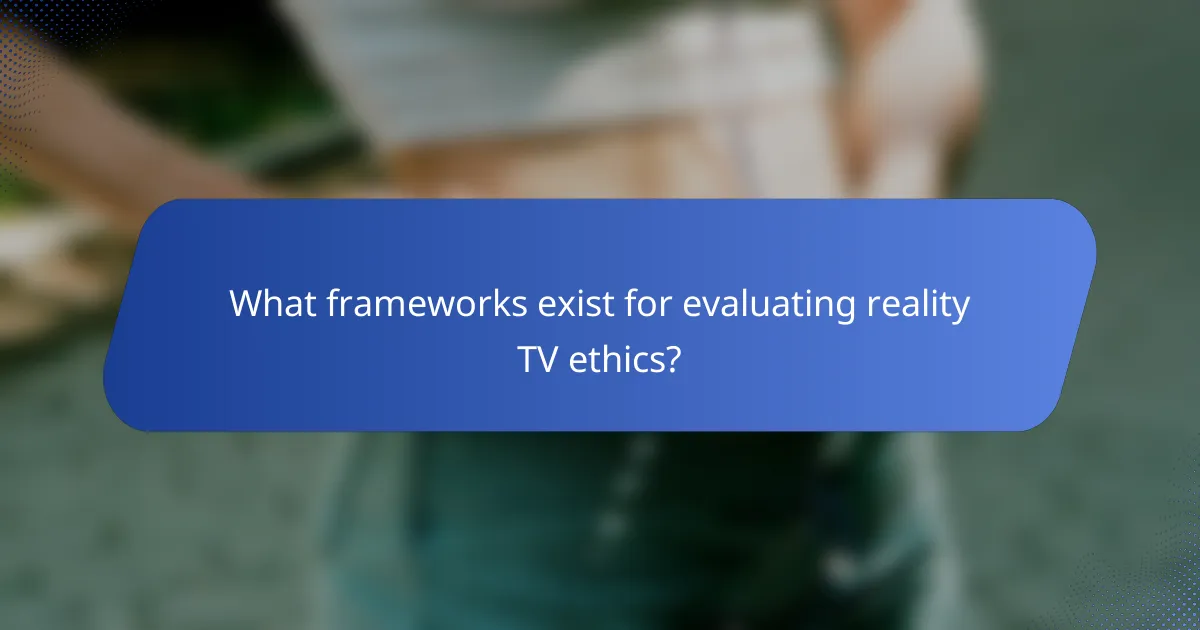
What frameworks exist for evaluating reality TV ethics?
Evaluating reality TV ethics involves frameworks that assess the impact of public scrutiny, editing biases, and performance pressures on participants. These frameworks help ensure that shows adhere to ethical standards while balancing entertainment value with participant welfare.
Industry standards and guidelines
Industry standards for reality TV often include ethical guidelines set by organizations like the Producers Guild of America (PGA) and the National Association of Broadcasters (NAB). These guidelines emphasize transparency, informed consent, and the fair treatment of participants.
For instance, reality shows should provide clear disclosures about the editing process and the potential for dramatic representation. This helps mitigate the risks of misrepresentation and ensures that participants understand how their actions may be portrayed.
Producers should also consider the psychological impact on participants, implementing measures to support their mental health throughout the filming process. Regular check-ins and access to counseling can be beneficial in addressing the pressures of performance and public scrutiny.





